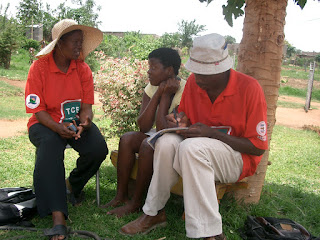But as we hail the achievements of the last decade, one very important question begs an urgent answer: “Have we done enough to expect an AIDS-free generation any time soon?” As I’ve recently witnessed, complacency related to antiretroviral drugs may be fast eating into this dream.
| EstherWambui/Photos Participants at Toronto AIDS Walk For Life arrive at the city's AIDS Memorial |
I was concluding a visit there after five years of living abroad. And as it is customary I ended up at a hair salon for some braids that would take several hours to do. With so much time to pass, I eventually broached my favourite topic…HIV/AIDS. I instantly noticed something positively different. Unlike five years ago, people are no longer shy to discuss the epidemic. They have seen and heard enough about it already to become part of daily conversation. One of the women was in her mid-30s and she vehemently declared that if some guy thought to “bring” her HIV, she would personally kill him.
The other two women however, were in their early twenties and had a different tone. One said that she did all she could to avoid infection, but that accidents do happen anyway. Then the third woman made a statement that forms the crust of my viewpoint today. Unfazed by all our (ABCD*) talk, she boldly declared that medication for HIV was now available and there was no more need for all the panic. She went on to say that people should be left alone to “enjoy fear-free, guilt-free sex”.
I froze to my bone on hearing this. As a certified basic HIV/AIDS educator, I’m aware that antiretroviral therapy is an important part of the curriculum, with an emphasis on ARVs as one of a number of ways to enhance the life of sufferers. ARVs never have and do not cure AIDS or HIV for that matter.
Thus as we commemorate three decades of HIV, we need to remember the under-thirty generation, for whom the epidemic has always been a way of both vocabulary and life; a generation that didn’t have to deal with the shock-value of the emergence of an incurable disease. For them, HIV/AIDS is one of the many other chronic diseases.
 |
| EstherWambui/Photos Two TCE [South Africa] Field Officers give an HIV/AIDS awareness lesson to a teenage girl |
Is it time to revisit the focus of ARVs education or do we need to implement an altogether new program?
While we must continue giving hope to those already infected, we need to make sure that the uninfected know all there is to know about these drugs. Let’s have an ARV-only program. A program that tells the young that yes ARVs are there. Yes, they are available although to a relatively small and select number in poor countries. And yes, they do improve the quality of life for the infected. Likewise, I believe time has come to revisit the education of earlier years. Be forthright, open, frank, and remind people that these drugs are not a cure.
Let emphasis be placed on the ills of long-term use of these drug: The numerous side effects that range from relatively mild ones, to very serious ones that in themselves impact quality of life. Add that to treatment failure, drug toxicity and in some cases, resistance to these drugs. This in itself should disturb the unfazed, the fact that once you’re on ARVs you’re always on ARVs. That you never stop taking them, a concoction of pills for the remainder of your life!
In the fight against HIV, we always hope that everyone gets the message. But as is the way of life, some people might or probably will always fall through the cracks. I’m okay with that as long as they fall knowing that crack is a life-altering one to fall into - one that you eventually pay for with your life.
With an estimated 33.3 million people currently living with the virus, the only thing I can hope for is that the young woman is by all means an exception, not an indicator of her generation’s mindset.
*Abstain, Be Faithful, Condomize, or Do-it-Yourself.
What do you think friends. Without a cure in sight, is it reasonable to expect an AIDS-free generation any time soon?
ReplyDeleteI think its a relevant question, and one that has to be on the agenda. Strides in PMTCT already show that this question is being answered. In SA now over 90% of babies from HIV+ parents are being born negative.
ReplyDeleteIts so sad to read your observation about a whole generation that was born in the era of HIV and AIDS, and yet not necessarily HIV and AIDS smart. Of course am generalizing here but the overal wish is there should not be new infections in this generation, yet there are. Of course lots of factors are at play, poverty included but then, am not even sure that poverty should continue to be the excuse.
For me your saloon discussion points to the critical and strategic need of testing for HIV as an entry point. Am convinced that those who know their status act more responsibly and think twice about their choices compared to those who have not tested. So for me testing in schools is key and strategic to this question. Please note that am not saying its easy, but I think its the right thing